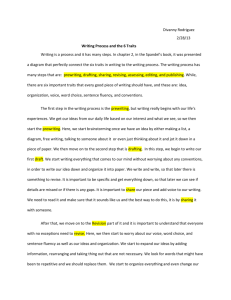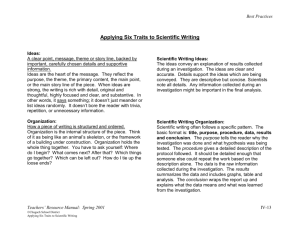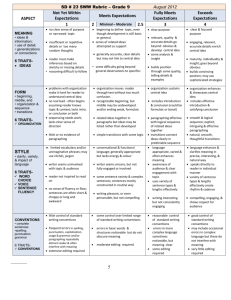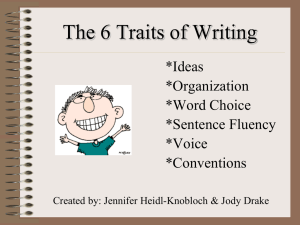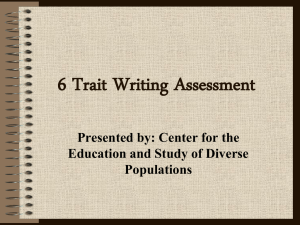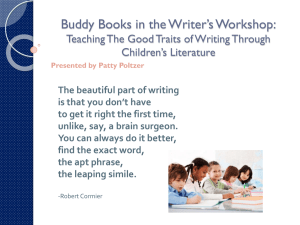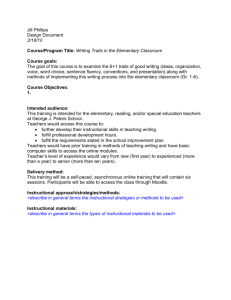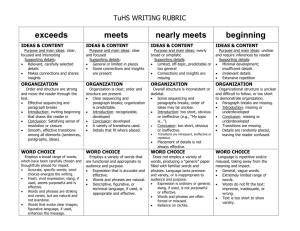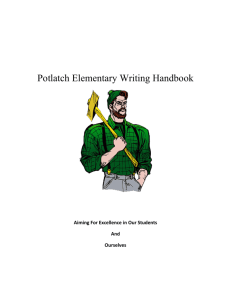six traits to good writing
advertisement
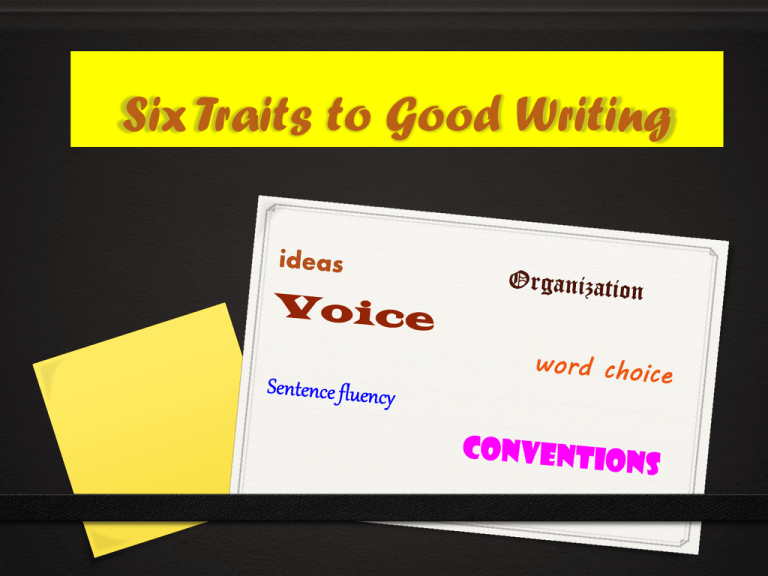
Six Traits to Good Writing What are The 6 Traits of Writing? 0 The traits are not new. A trait can be defined as a quality or characteristic critical to successful performance. Just as there are traits for good ice skating, like balance, grace, technical skill and so on, there are traits for good writing. Six Traits 0 Ideas 0 Word Choice 0 Organization 0 Sentence 0 Voice Fluency 0 Conventions Traits give the writer a clear picture of what to do to revise their writing - making it the best it can be. What are The 6 Traits of Writing? 0 The traits for good writing include ideas, organization, voice, word choice, sentence fluency, and conventions. Traits give the writer a clear picture of what to do to revise their writing - making it the best it can be. 0 We want students to be able to transfer the writing skills they have developed in their language arts classes to writing whenever it’s used, not just within their language arts experience. Ideas 0 The ideas are the heart of the message, the content of the piece, the main theme, together with the details that enrich and develop that theme. They are the reason we are writing. What parents can do to encourage good ideas: 0 Parents can suggest that their children ask the following: Is my message clear? Do I know enough about my topic? Is it interesting? Is my topic “small” and focused? Did I show what was happening? Organization 0 Organization is the internal structure of a piece of writing, the thread of central meaning, the logical and sometimes intriguing pattern of the ideas. 0 Organization gives direction to all writing by drawing the reader in. It enhances and showcases the central theme or storyline. Everything fits together like a puzzle, leaving the reader with something to think about. What parents can do to encourage organization: 0 Parents can suggest that their children ask the following: Does my paper have a good opening that captures the reader’s attention? Are my ideas in the best order? Does my paper have a strong ending? Voice 0 The voice is the heart and soul, the magic, the wit, along with the feeling and conviction of the individual writer coming out through the words. 0 Voice gives writing personality, flavor and style. In a paper with strong voice, the writer speaks directly to the reader and is sensitive to the reader’s needs. How parents can help with Voice 0 Parents can suggest that their children ask the following: Does this writing sound like me? Did I say what I think and feel? Does my writing have energy and passion? Is it appropriate for my audience and purpose? Word Choice 0 Word choice is the use of rich, colorful, precise language that moves and enlightens the reader. 0 Word Choice enriches our writing and makes it almost come alive. Precise words add energy and clarity. Words convey the intended message in a clear, interesting and natural way. Suggestions for parents about Word Choice: 0 Parents can suggest that their children ask the following: Will my reader understand my words? Were my words accurate, original, and just right? Did I use energetic verbs? Did I use language that painted a picture? Sentence Fluency 0 Sentence fluency is the rhythm and flow of the language, the sound of word patterns, the way in which the writing plays to the ear-not just to the eye. 0 Sentence Fluency gives our writing rhythm with an easy flow when read aloud. Sentences are well built with strong and varied structures. Sentences are clear and powerful. As our writing skills grow, we learn new ways to “sculpt” our writing. Parent suggestions for Sentence Fluency: 0 Parent Suggestions: How does my writing sound when read aloud? Do my sentences begin in different ways? Are some sentences long and some short? Conventions 0 Conventions are the mechanical correctness of the piece-spelling, grammar and usage, paragraphing, use of capitals, and punctuation. 0 Once our writing is revised, we are ready to edit and proofread. It’s like wrapping a package - we want to prepare our writing so others can read and enjoy it. Conventions deal with fixing our work (e.g. grammar, capitalization, punctuation, usage, spelling, paragraphing) so that our work is as error-free as possible How to help your child with Conventions: 0 Parents can ask their children: Did I paragraph correctly? Is my spelling correct? Did I correctly use periods, question marks, commas, quotation marks, and other punctuation marks? Did I use capital letters correctly? The 6 Traits of Writing ideas Voice Organization word choice sentence fluency conventions
